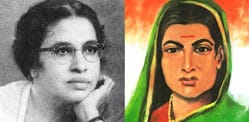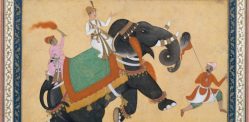These women have made significant contributions to their respective fields.
Pakistan, a country with a rich cultural heritage and a complex history, has seen many women who have broken barriers and made significant contributions across various fields.
These women have not only rewritten history but have also paved the way for future generations of Pakistani women to follow in their footsteps.
Benazir Bhutto was the first woman to head a democratic government in a Muslim-majority nation.
Malala Yousafzai is a global icon for female education and the youngest Nobel Prize laureate.
Arfa Karim was a computer prodigy who, in 2004 at the age of nine, became the youngest Microsoft Certified Professional (MCP) in the world.
Asma Jahangir was a fearless human rights lawyer and social activist who co-founded and chaired the Human Rights Commission of Pakistan.
Samina Baig is the first Pakistani woman and the first Muslim woman to climb Mount Everest, the world’s highest peak.
Here we will dive deeper into their lives, their influences on government systems, technologies, and how they inspire both youth and adults alike, and more!
Benazir Bhutto

Benazir Bhutto’s impact on history is profound and multifaceted, marking her as one of the most influential figures in South Asian politics.
Moreover, she is a pivotal character in the global discourse on democracy, women’s rights, and political leadership in Muslim-majority countries.
Benazir Bhutto shattered the glass ceiling in the Islamic world by becoming the first woman to lead a Muslim-majority nation.
Her election as Prime Minister of Pakistan in 1988 was a groundbreaking ‘event’.
It challenged traditional norms and inspired women worldwide, demonstrating that women could attain and excel in the highest echelons of political power.
Bhutto was a staunch advocate for democracy in Pakistan.
At her time the country was oscillated between military rule and democratic governance.
Her leadership and her struggles against authoritarian regimes have been inspirational for many,.
Thus, highlighting the importance of democratic processes and civil liberties.
During her terms in office, Bhutto implemented policies aimed at poverty reduction, health care improvement, and education.
She sought to modernise Pakistan’s economy and infrastructure.
She faced many political challenges and difficult economic conditions of her time.
Bhutto was a symbol of women’s empowerment in Pakistan and beyond.
She advocated for women’s rights and worked towards increasing women’s participation in the workforce and politics.
Her tenure saw the appointment of women to high judicial positions and an increase in educational opportunities for girls.
Benazir Bhutto was not just a national leader; she was a global figure who represented Pakistan on the international stage.
Her charisma, intelligence, and eloquence made her a respected leader among the international community.
She worked to improve Pakistan’s relations with the West, as well as with neighbouring countries.
Her assassination in December 2007 was a tragic event that had a profound impact on Pakistani politics and society.
It underscored the volatile nature of Pakistan’s political landscape and the dangers faced by those who challenge the status quo.
Her death led to a wave of sympathy and support for her party.
Benazir Bhutto’s legacy is enduring, with her life and work continuing to inspire women and girls in Pakistan.
She also fought for democracy and gender equality around the world.
Her story is a testament to the challenges and possibilities that come with breaking barriers.
She strives for change in societies marked by deep-seated traditions and political complexities.
In summary, Benazir Bhutto’s impact on history is significant, with her contributions to politics, women’s rights, and democracy in Pakistan.
Her influence on the global stage defines her as a key historical figure of the late 20th century.
Malala Yousafzai

Malala Yousafzai’s impact on history is profound and far-reaching.
She is one of the most influential advocates for education and women’s rights in the 21st century.
Her story is not just one of personal triumph but also a beacon of hope and a call to action for global education reform.
Malala has become the global face of the fight for girls’ education.
After surviving an assassination attempt by the Taliban for her activism, she has used her voice to advocate for the right to education for all children around the world.
Her courage and determination have drawn international attention to the barriers to education.
Especially for girls in developing countries.
In 2014, Malala became the youngest-ever Nobel Prize laureate at the age of 17, sharing the Peace Prize with Kailash Satyarthi, an Indian children’s rights activist.
The award recognised their struggle against the suppression of children and young people and for the right of all children to education.
This accolade not only highlighted her contributions but also amplified her message globally.
Malala co-founded the Malala Fund with her father, Ziauddin Yousafzai.
The fund’s mission is to advocate for 12 years of free, safe, and quality education for every girl.
Through this platform, she has mobilised resources, funding, and support for education programs in various countries, including Pakistan, Afghanistan, India, Nigeria, and Syria.
Malala has addressed the United Nations, met with world leaders, and spoken at numerous global forums.
She acts as an advocate for education and women’s rights.
Her speeches and autobiography, “I Am Malala,” have inspired millions worldwide to support the cause of education and to stand up against oppression and discrimination.
Malala’s advocacy has contributed to the launch and reinforcement of several international initiatives and policies.
These were aimed at expanding educational opportunities for girls.
Her work has helped to increase awareness and funding for educational programs in regions where girls are often denied access to education.
Malala Yousafzai’s impact extends beyond her achievements and accolades.
It is woven into the lives of the girls and young women who now have hope for a future filled with opportunities.
Her journey from a young girl in Swat Valley, Pakistan, to a Nobel laureate and global activist is a testament to the power of voice and conviction in the fight for justice and equality.
Arfa Karim

Arfa Karim’s impact on history, particularly in the fields of technology and education, is both inspirational and transformative.
As a young prodigy, her achievements not only showcased her exceptional talents but also served as a beacon of hope and motivation for people around the world.
In particular, in regions where access to education and technology is limited.
At the age of nine, Arfa became the youngest Microsoft Certified Professional (MCP) in the world in 2004.
This achievement was not just a personal milestone; it broke international records and put her on the global map as a symbol of youth potential in the technology sector.
Arfa’s story is particularly inspiring for girls in Pakistan and other countries.
Her influence is prevalent where cultural and societal norms often limit girls’ participation in science, technology, engineering, and mathematics (STEM) fields.
She demonstrated that with passion and dedication, young girls could excel in technology and make significant contributions.
Through her achievements and the attention she garnered, Arfa highlighted the importance of providing children with access to education and technology.
Her story underscores the potential that can be unlocked when young minds are nurtured and allowed to explore their interests in STEM fields.
Arfa’s recognition went beyond national borders, making her an international figure in discussions about youth in technology.
She was invited by Bill Gates to visit the Microsoft Headquarters in the USA.
This event emphasised the importance of nurturing young talent globally.
After her untimely death in 2012, the Arfa Karim Foundation was established to continue her mission of empowering youth through technology and education.
The foundation works to provide resources, training, and opportunities to young people in Pakistan.
She perpetuates a vision for a more inclusive and technologically adept future.
Her legacy continues to influence and inspire a new generation of young minds to explore their potential in technology and beyond.
She is a timeless figure in the narrative of youth empowerment and technological innovation.
Asma Jahangir

Asma Jahangir’s impact on history is profound, particularly in the realms of human rights, and democracy.
She fights for justice in Pakistan and internationally.
Her life’s work has left an indelible mark on the global human rights movement.
She acts as an advocate for the marginalised and sets a high standard for courage in the face of adversity.
Asma Jahangir was relentless in her defence of human rights, women’s rights, and the rights of religious and ethnic groups in Pakistan.
Her advocacy extended to the most vulnerable in society, including prisoners, labourers, and women subjected to violence.
Thus, showcasing her commitment to justice for all, regardless of their status or background.
Jahangir’s work as a lawyer was groundbreaking.
She co-founded and served as the Chairperson of the Human Rights Commission of Pakistan.
Through her legal expertise, she challenges oppressive laws and practices.
She was instrumental in legal battles that sought to protect human rights and reform laws that discriminated against certain groups.
Jahangir’s influence was not confined to Pakistan.
She served as the United Nations Special Rapporteur on Extrajudicial, Summary or Arbitrary Executions and on Freedom of Religion or Belief.
Thus, bringing international attention to human rights issues in various countries.
Her reports and findings have been crucial in shaping international human rights policies and practices.
Jahangir was a vocal critic of military dictatorships and undemocratic practices in Pakistan.
She faced arrest and was put under house arrest multiple times for her outspoken opposition to military rule.
Her resilience in the face of such repression inspired many to stand up for democracy and civil liberties.
Jahangir was a pioneer in the fight for women’s rights in Pakistan.
She challenged laws and cultural practices that oppressed women, advocating for equal rights and opportunities.
Her efforts have paved the way for future generations of women to pursue careers in law and activism.
Jahangir’s legacy continues to inspire human rights defenders around the world.
Her life exemplifies the impact one individual can have on the fight for justice and equality.
Many activists today draw inspiration from her courage, dedication, and unwavering commitment to human rights.
Jahangir received numerous awards and honours for her work, including the Right Livelihood Award, sometimes called the “Alternative Nobel Prize,”.
This was granted for her tireless work for human rights in Pakistan and beyond.
These accolades reflect the international community’s recognition of her contributions to the global human rights movement.
Asma Jahangir’s impact on history is characterised by her fearless advocacy, legal acumen, and unyielding commitment to human rights.
Her work has not only changed lives but also shaped the discourse on human rights, democracy, and justice in Pakistan and around the world.
She is one of the most respected and influential figures in the global struggle for human dignity and freedom.
Samina Baig

Samina Baig’s impact on history, particularly in the context of mountaineering, women’s empowerment, and societal norms in Pakistan and beyond, is very significant.
She was the Pakistani woman and the first Muslim woman to climb Mount Everest.
Her achievements have resonated well beyond the realms of sports and adventure.
On May 19, 2013, Samina Baig reached the summit of Mount Everest at the age of 21.
She was the first Pakistani woman to achieve this feat.
This accomplishment was not just a personal victory but also a breakthrough for women in a sport.
it is a sport that is often dominated by men and perceived as beyond the reach of women from conservative societies.
Baig’s success has made her a role model for women in Pakistan and around the world.
Thus, shows that with determination and hard work, women can excel in any field, including those traditionally dominated by men.
Beyond her mountaineering pursuits, Samina Baig has used her platform to advocate for gender equality, women’s rights, and education.
She has been involved in various initiatives and campaigns that aim to empower women and girls
In particular, in rural and underprivileged areas, to pursue their dreams and ambitions.
Her expeditions and public appearances have served as platforms to raise awareness about climate change and environmental degradation.
In particular, in the fragile ecosystems of high-altitude regions.
Baig’s success has contributed to a growing interest in mountaineering and adventure sports in Pakistan.
Pakistan is a country home to some of the world’s highest peaks.
She has inspired people to explore the outdoors and take up challenges that were once considered beyond their reach.
Samina Baig’s impact extends beyond her historic climb.
Her legacy is a testament to the power of courage, vision, and perseverance in overcoming obstacles and making a mark on history.
These women, among others, have made significant contributions to their respective fields.
They have also challenged societal norms and inspired a new generation of women to dream big and break barriers.
Their stories of courage, determination, and resilience continue to inspire people around the globe.






























































